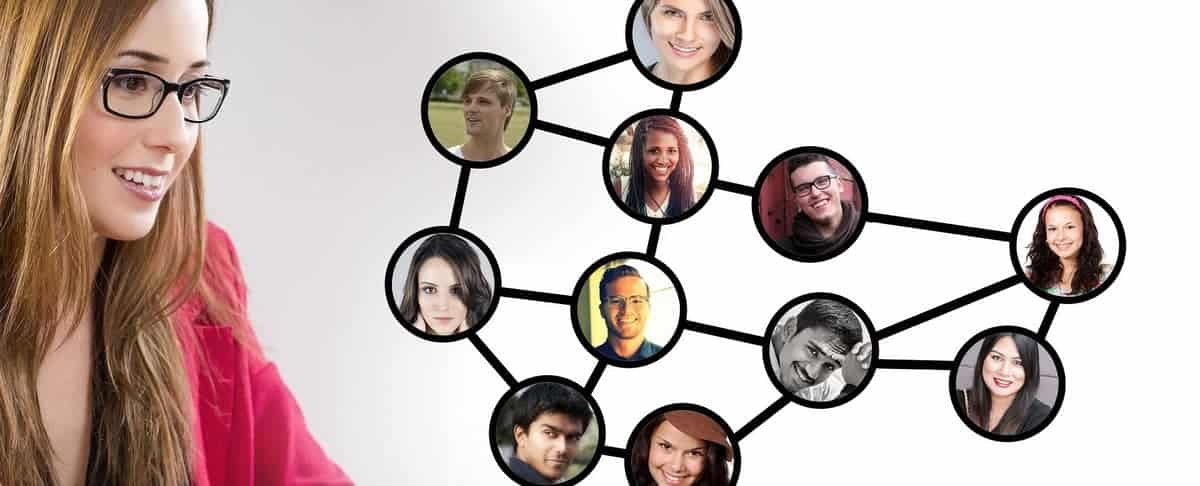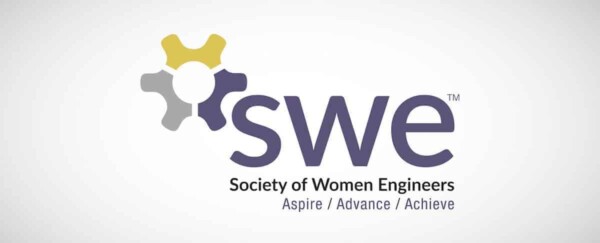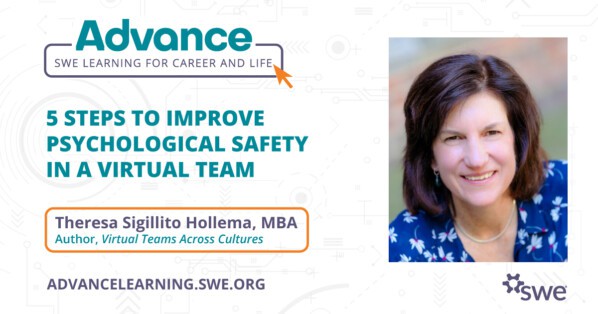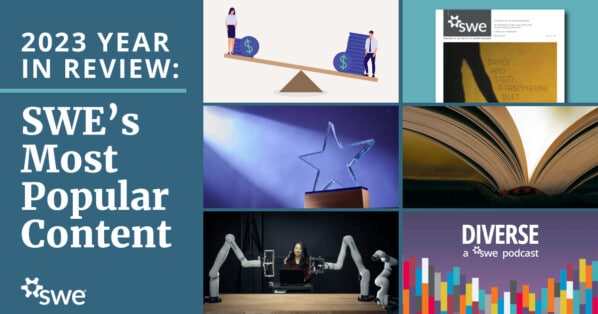What kind of impact can participation in women’s networking events have for attendees? As noted last year in the Harvard Business Review, 78% of attendees surveyed following a women’s networking event said they felt “more optimistic about the future” after attending the event. 71% said they felt “more connected to others.” Conferences and events present an opportunity to network, but of more importance, they’re also an opportunity to come together as a community of individuals with important shared connections. Karen Horting, executive director and CEO of the Society of Women Engineers (SWE), recently shared her perspectives on what this looks like and how to do networking more effectively in an interview with Influential Women in Manufacturing communications intern Alexandra Ditoro.
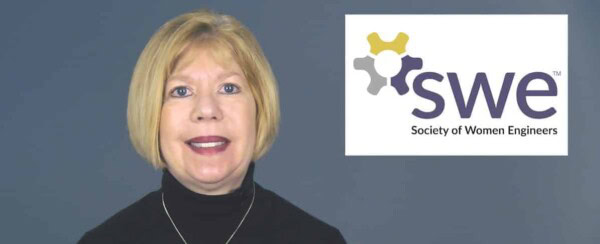
SWE’s mission is to “empower women to achieve full potential in careers as engineers and leaders, expand the image of the engineering and technology professions as a positive force in improving the quality of life, and demonstrate the value of diversity and inclusion.” How do SWE events and networking opportunities factor into that for you, and what to you defines success in networking?
“We talk a lot about success at SWE being it’s sort of your definition, so success on your own terms. But we hear a lot from our members about how the networks they formed through groups like SWE really help them have that support that they need. Because, in most cases they still are working in a male-dominated environment, and so being able to have that network of peers that can help them through challenges, that can kind of be their sounding board, is really important. In many cases they’ve cited the network as the reason they’ve stayed in the field. That if it wouldn’t have been for their peer network, they may have left the profession. In addition, we hear a lot from women in the field about how they found out about opportunities through their network, whether it was their first job or their next opportunity it was really through the network and the connections that they’ve made at events like the SWE conference. That’s really helped them. I mean we hear from some members who say, ‘I’ve never really looked for a job. It’s been through my SWE network where I’ve learned about all the opportunities.’ Or even opportunities within their own organization, that they wouldn’t have met some of the senior leaders in that within their companies if it hadn’t been for SWE conference and the ability to meet them and network with them that way.”
How does SWE provide networking and connection opportunities?
“I think we do that a couple of ways. One, we have a really strong local network across the country, and now globally, where we have what we call sections and affiliations. This is a way for people to connect locally in a geographic area and come together for professional development or networking activities or outreach events for young girls, and really each other. Then on the conference side, we have our big annual conference. The event that’s coming up in Anaheim in November is a three-day event of workshops, panels, keynote speakers and different types of social activities that allow people to network and make those connections. We also have a two-day career fair with over 300 global employers. That’s a great way to connect if you’re looking for a career opportunity or maybe passively seeing what might be out there. We have a smaller version of the annual conference that takes place in the winter and spring that we hold in seven locations in the US, India and Europe. And we call it ‘networking locally, learn socially,’ so it’s really about coming together, perhaps in a geographic area that’s closer to where you live, and connecting with women in engineering as well as employers in that area. We really try to facilitate a lot of networking through those face-to-face events from the conference side, but also from what happens through our local sections and affiliates.”
What do you do before, during, and after an event to prepare and make sure you’re following up and taking advantage of potential connections?
“Before events I go to, like for association leaders and that, typically we get to see who’s registered. I take a look and see what old friends are going to be there and then who is going to be there whom I haven’t met that I would like to meet, or are there particular vendor partners maybe that are going to be there that provide services we may be looking to take on as an organization. I’ll make my list of ‘OK, who do I want to be sure I connect with, and who’s new that I want to try to meet.’ A lot of times I’ll send some emails ahead of time and say, ‘Hey, I see you’re going to be there, let’s try to catch up over coffee or a drink.’ You know, it’s hard but sometimes even though I know a lot of people it’s like, ‘Alright, this morning I’m going to sit down with my coffee with somebody I don’t know and get to meet them.’ And I think the more you do that the easier that gets, because most people are looking to network as well. Sometimes, when you can break the ice that first time, then it just gets easier. And then certainly afterward, you know, following up with emails and phone calls, and then just trying to keep that connection. You don’t want to just be reaching out to somebody when you need something. You want to try and build that relationship, build that connection. And then, you know, when you do need it, then I think people are more likely to want to help or provide input or be a resource because you sort of built that relationship with them. That’s what I think about networking–it’s building relationships.”
When at an event, what kinds of activities do you find the most connection value from?
“I would say definitely the social events, because it’s natural that people are kind of networking. But then I also try to look for sessions that are solving a particular problem I may be having or something I’m trying to learn more about, because I figure they’ll be other people like me in the room that are either trying to solve that challenge or are trying to learn more about it. I just try to chat with the people that I’m sitting near. Or if during a Q&A if somebody asks a particularly relevant question, then I try to catch up with them after the session and say: ‘Hey, I had that same question, Can we chat about that a little bit? What are you doing to deal with that or how are you framing how you’re thinking about it?’ I’ve met some great people that way, where now we have a connection because we’re sharing with each other how we’re navigating whatever it is that was of interest. It’s a good way to find people.”
What have you learned about networking that you wish you would have known sooner?
“I think I wish I would have known sooner that it’s more than just exchanging that business card. I mean, I think intuitively I knew that, but I think that I was always a little intimidated to start the conversation and that getting the business card was kind of like a quick easy way to navigate. But I’ve learned just starting with the conversation, learning about somebody, seeing if there is a potential for a connection, and then getting that contact information. To start with the conversation and getting to know somebody, and not worrying so much if they’re a fit for my network. Everybody may not be a fit. You may meet some people and they may be interesting, but they’re just not a fit for the network. Or maybe they will be down the road and you just don’t see it yet. I’ve met some people years ago that I never thought would be an important part of my network. And now I’ve moved into this role and some of the things we’re doing within SWE, I think, ‘Wow, that person. I’m gonna reconnect with them and see how some of their connections in China may be able to help us.’ You never know when that person that you’ve met may become an important part of your network. Don’t go into it with the end game in mind; first, just start to get to know somebody. Sometimes people come up to me and they want my card, and it’s like, ‘Well, why?’ Tell me about yourself. Tell me what you’re doing and tell me why you’re interested in being connected, versus just ‘I wanted to meet 20 new people’ or something.”
What are you looking forward to with SWE this year?
“I’m really looking forward to how we’re growing. Our membership is growing; attendance at our events is growing, which is great because our mission is helping women succeed and advance in engineering. And women are still only 13% of the engineering workforce. So, the more women we can connect with, the more we can help them succeed and advance in their careers. I’m just excited that we’ve got momentum. And the more women that can be part of the organization and be part of the things that we’re doing I think will be better for the profession and better for the country. We’ve heard from so many members and they just wouldn’t be where they are now in their career had it not been for their SWE network. And so I would say, especially if you’re in the field and you’re feeling a bit isolated, please come be part of our community.”
Several 2019 Influential Women in Manufacturing honorees are SWE members and leaders, including Diane Doise (Syngenta), Jonna Gerken (Pratt and Whitney), Jennifer LaVine (Sikorsky Aircraft) and Wendy Smith (Optimation Technology). Read their stories in the 2019 IWIM eBook, available for download Sept. 3.
“How to Network More Effectively, From the CEO of SWE” was written by Alexandra Ditoro and originally published on influentialwomeninmanufacturing.com.
Author
-

SWE Blog provides up-to-date information and news about the Society and how our members are making a difference every day. You’ll find stories about SWE members, engineering, technology, and other STEM-related topics.

